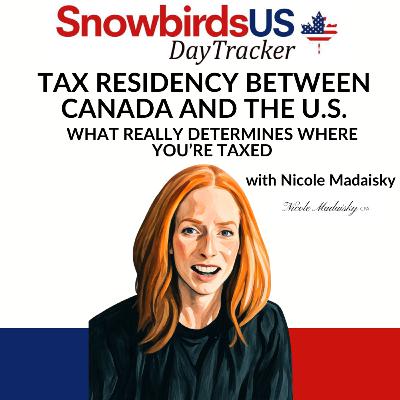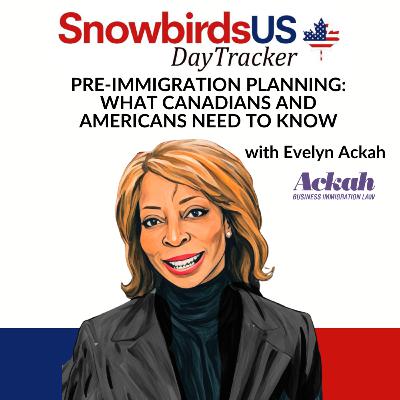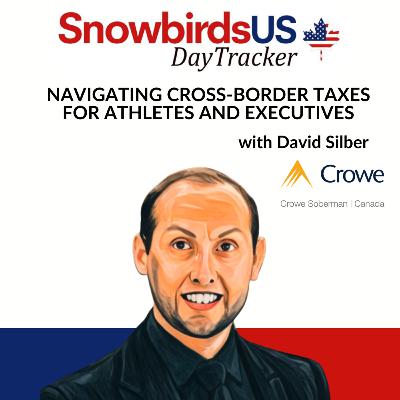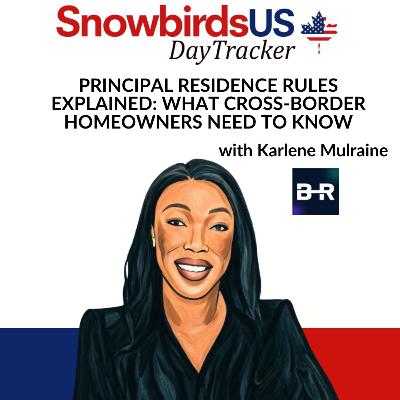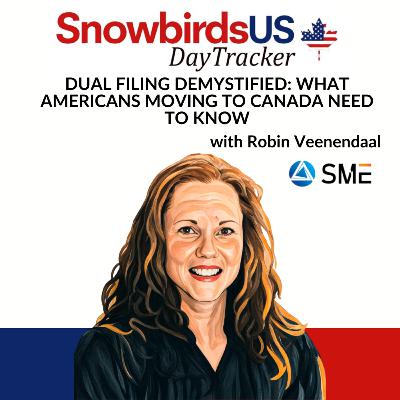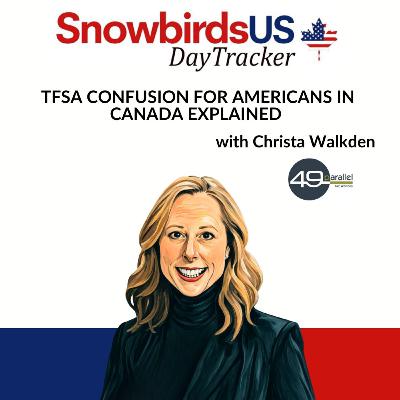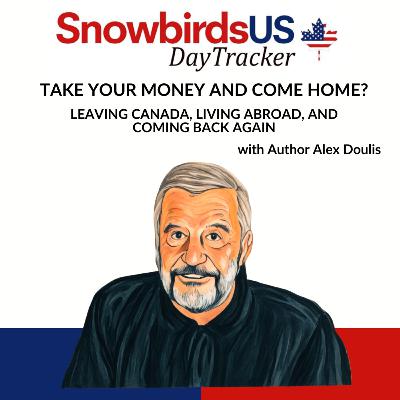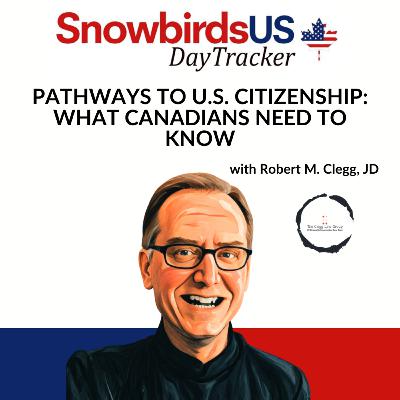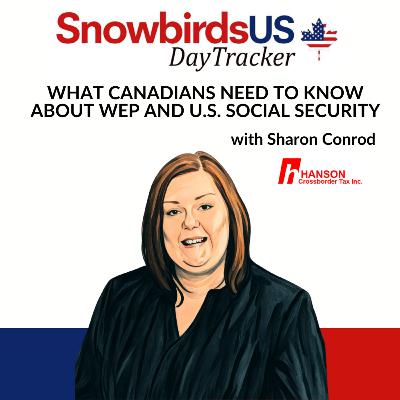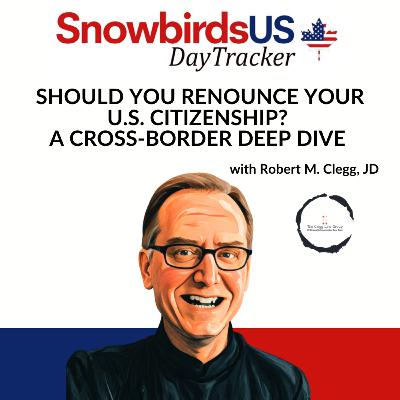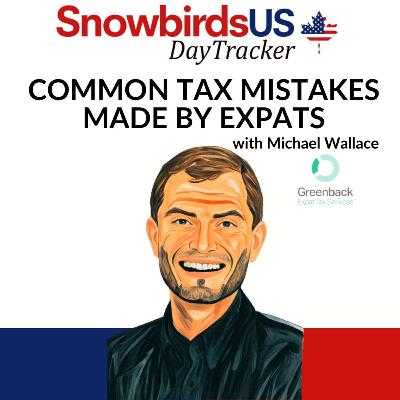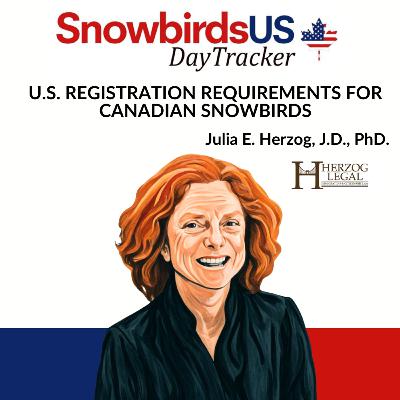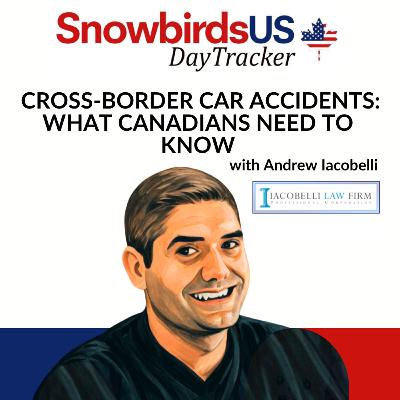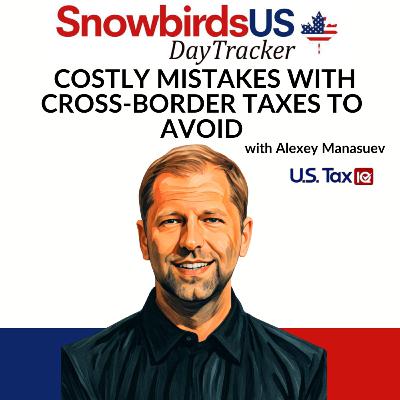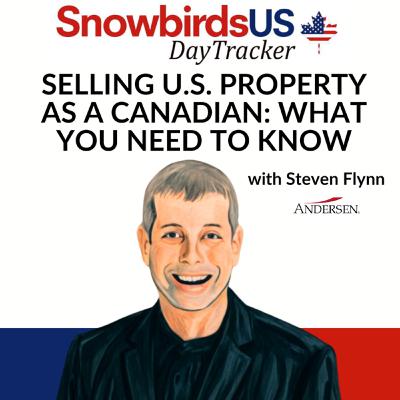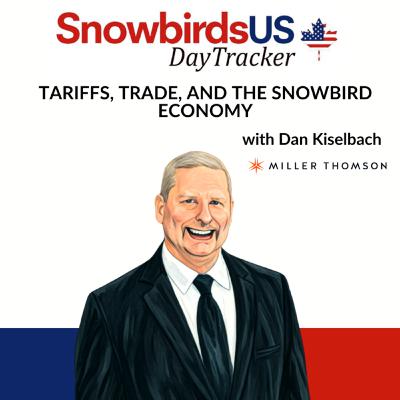Discover Snowbirds US Expats Radio Podcast
Snowbirds US Expats Radio Podcast

Snowbirds US Expats Radio Podcast
Author: Gerry Scott
Subscribed: 2Played: 23Subscribe
Share
© Gerry Scott
Description
Whether you're a Canadian snowbird spending winters in the USA, or an American looking to move to Canada, the Snowbirds Expats Radio Podcast is loaded with useful information to guide you. Gerry Scott is the host of this podcast, Monday to Friday, Gerry works with Canadian and US clients as a cross border advisor with one of Canada’s largest and most respected wealth management firms..
The Snowbirds Expats Radio Podcast is brought to you by the Snowbirds US Day Tracker and the Canada Physical Presence Tracker apps. The Snowbirds US Day Tracker app helps you track the number of days you’re spending in the USA, which is essential to avoid being classified by the IRS as a US resident for tax purposes.
The Canada Physical Presence Tracker is the easiest and most reliable way to track your physical permanent days for the purpose of renewing your permanent residence card (maple card). Simply enter the days into the calculator and track the progress as you get closer and closer to becoming a full time resident of Canada.
Both apps offer a wide variety of services that include, USD exchange, tax and legal services, Real Estate, Medical Tourism, and more. Download them today on your iPhone or Android.
The Snowbirds Expats Radio Podcast is brought to you by the Snowbirds US Day Tracker and the Canada Physical Presence Tracker apps. The Snowbirds US Day Tracker app helps you track the number of days you’re spending in the USA, which is essential to avoid being classified by the IRS as a US resident for tax purposes.
The Canada Physical Presence Tracker is the easiest and most reliable way to track your physical permanent days for the purpose of renewing your permanent residence card (maple card). Simply enter the days into the calculator and track the progress as you get closer and closer to becoming a full time resident of Canada.
Both apps offer a wide variety of services that include, USD exchange, tax and legal services, Real Estate, Medical Tourism, and more. Download them today on your iPhone or Android.
77 Episodes
Reverse
In this episode of the Snowbirds Expat Radio, host Gerry Scott welcomes back cross border tax specialist Sharon Conrod of Hanson Tax LLC for a timely conversation on one of the most misunderstood cross border situations today Canadians living in Canada while working for U.S. employers.As more professionals take U.S. roles while residing north of the border questions around 401k plans IRAs RRSP room and treaty relief are becoming increasingly common and increasingly complex. Sharon explains how U.S. retirement plans are treated in Canada when deductions are available why tracking basis matters and where many people unknowingly create future tax issues.The discussion also explores remote work considerations employer matching crystallization strategies state level tax risks and why there is truly no one size fits all solution when families live and work across borders.What You Will LearnHow 401k and IRA contributions are treated when you live in CanadaWhen U.S. retirement contributions may or may not be deductible in CanadaWhy RRSP room limits matter for cross border commutersThe role of Form RC268 and why it is critical for Canadians with U.S. plansHow employer matching works and when it still makes sense to participateWhy tracking non deductible contributions over time is importantHow crystallizing RRSPs before moving to the U.S. can reduce future taxesWhy certain U.S. states can complicate otherwise treaty protected plansCommon mistakes remote workers and employers makeWhy residency and family dynamics matter in cross border planningWhy This Episode MattersCross border work arrangements have grown significantly but the tax rules have not become any simpler. This episode highlights why working with experienced cross border professionals can help prevent costly mistakes both now and in the future.
In this episode of the Snowbirds Expat Radio Podcast, host Gerry Scott welcomes back returning guest Aaron Dawes, a cross-border personal tax expert with Smythe.While previous conversations focused on Canadians heading south, this discussion flips the script. With shifting economic, political, and lifestyle factors, more Canadians—and Americans—are now moving north, returning to or relocating to Canada despite weather, cost, and lifestyle tradeoffs.Aaron explains what’s driving this trend and what individuals need to consider before making the move, especially when it comes to cross-border tax exposure.In this conversation, Gerry and Aaron discuss:Why more Canadians are returning home from the U.S.What’s motivating Americans to relocate to CanadaHow lifestyle, stability, and long-term planning factor into relocation decisionsThe tax implications of moving between the U.S. and CanadaWhy cross-border tax planning is critical before you moveCommon mistakes people make when changing tax residencyHow working with a specialist can prevent costly surprisesWith decades of experience handling U.S.–Canada personal tax matters, Aaron offers practical insights for snowbirds, expats, and globally mobile families navigating an increasingly complex cross-border landscape.If you’re considering a move—or a move back—this episode highlights why planning ahead matters more than ever.Spending time in the U.S.? Take the guesswork out of tracking your days. Download the Snowbirds U.S. Day Tracker app to monitor your stays, stay compliant, and avoid costly surprises at the border.Connect with Aaron Dawes
What does it really mean to leave Canada — and how do you know when you’ve crossed the line from spending time abroad to officially exiting?Host Gerry Scott sits down with Jennifer Reid CPA, CGA, TEP and Frank Casciaro of RSM, two cross-border tax specialists who advise Canadians navigating complex international lives — from snowbirds and dual citizens to executives, business owners, and globally mobile families.With deep experience in international tax and firsthand insight from working with clients before, during, and after a Canadian exit, Jen and Frank break down why leaving Canada is not just a lifestyle decision — it determines how your assets are taxed, what reporting obligations follow you, and where costly compliance mistakes often happen.Together, Gerry, Jen, and Frank unpack the realities behind some of the most misunderstood rules in Canadian departure planning, including why residency is rarely as simple as counting days or keeping a Canadian mailing address.In this conversation, they explore:Why more than 106,000 Canadians left the country in 2025 — and what’s driving the trendThe difference between being a factual resident and a non-resident of CanadaWhy spending a few months abroad doesn’t automatically mean you’ve exitedWhat departure tax and “deemed disposition” really mean in practiceWhich assets are subject to departure tax — including worldwide holdings, not just Canadian onesWhen deferring departure tax may be possible, and why it’s becoming harder to doHow the Canada–U.S. tax treaty can help prevent double taxation — and where it falls shortWhy health care eligibility (including OHIP) is not tied to your tax returnThe compliance risks of keeping Canadian bank accounts, investments, or a family address after leavingTFSA, RRSP, and withholding tax issues that frequently catch departing Canadians off guardWhy planning before you leave is far less expensive than fixing mistakes afterwardIf you’re living, working, retiring, or investing outside Canada — or considering a permanent move — this episode offers a clear, practical look at what truly defines a Canadian exit and the planning steps that can save you from expensive surprises down the road.
What does it really mean to be a tax resident — and why do so many people accidentally get it wrong when moving between Canada and the United States?Host Gerry Scott sits down with Nicole Madaisky, a dual-licensed Canadian and U.S. CPA who specializes in complex cross-border lives — from snowbirds and dual citizens to professional athletes and globally mobile families.With deep experience in international tax and firsthand insight from working with clients on both sides of the border, Nicole breaks down why tax residency is not just a formality — it determines who gets to tax you, how much you owe, and where costly mistakes often happen.Together, Gerry and Nicole unpack the realities behind some of the most misunderstood rules in cross-border tax planning, including why residency is rarely as simple as counting days or holding a passport.In this conversation, they explore:Why tax residency — not citizenship — often determines which country can tax your worldwide incomeHow Canada’s primary and secondary residential ties actually work in practiceWhy the 183-day rule is frequently misunderstood and rarely tells the whole storyThe common ways Americans and Canadians unintentionally trigger tax residency without realizing itWhat snowbirds need to understand about time tracking, treaty rules, and U.S. exposureWhy buying property in Canada too early can create long-term tax and compliance issuesHow Canadian mutual funds can become a serious problem for U.S. taxpayersThe foreign reporting requirements that carry steep penalties when overlookedWhy cross-border planning works best when accountants, advisors, and immigration professionals work as a coordinated teamIf you’re living, working, retiring, or even just spending extended time between Canada and the U.S., this episode offers a clear, practical look at the rules that matter most — and the planning steps that can save you from expensive surprises down the road.Get In touch with Nicole: https://www.nicolemadaiskycpa.com/Spending time in the U.S.? Take the guesswork out of tracking your days. Download the Snowbirds U.S. Day Tracker app to monitor your stays, stay compliant, and avoid costly surprises at the border.
In this episode of Snowbirds US Expats Radio Podcast, Gerry Scott speaks with Donnie Arnoult, an avid cyclist, local business owner, and passionate advocate for Maui’s natural beauty.Donnie is the founder of Maui Cyclery, a well-known bike shop in the town of Pāʻia, and a trusted name in Maui’s cycling community.With decades of experience riding on and off-road across the island, Donnie always dreamed of creating something more immersive — a way to share the untamed beauty of Maui with both visitors and locals in a sustainable, approachable way.That dream became reality with Emountain Bike Tour Maui: a guided e-bike experience that allows riders of all levels to explore hidden trails, soak in stunning ocean and volcano views, and encounter local wildlife — all while treading lightly on the land.Donnie’s deep love for Maui and cycling shines through in every tour. His mission is simple: to connect people with the land through the joy of riding.Spending time in the U.S.? Take the guesswork out of tracking your days. Download the Snowbirds U.S. Day Tracker app to monitor your stays, stay compliant, and avoid costly surprises at the border.
What actually happens when you try to move between Canada and the United States without a solid immigration plan — and why are so many families getting stuck, delayed, or denied?In this episode, Gerry Scott sits down with Evelyn Ackah, Founder of Ackah Business Immigration Law, to unpack why pre-immigration planning has become essential for Snowbirds, cross-border families, and professionals navigating life on both sides of the border.With more than 25 years of experience — and her own personal journey immigrating to Canada — Evelyn brings both expertise and heart to the conversation. She explains how immigration, tax, real estate, and family planning all intersect long before an application is ever filed.Gerry and Evelyn break down:What pre-immigration planning really looks like (and why it saves money, time, and stress)How relocating affects tax residency, investments, real estate, and corporate structureWhat Canada’s reduced immigration targets mean for workers, families, and retireesThe most common mistakes people make when they DIY their immigration using Google or ChatGPTWhy border officials are showing increased scrutiny, from secondary screenings to Nexus revocationsNew U.S. rules requiring registration for anyone staying 30+ days, including teenagersHow to navigate life when one spouse is Canadian and the other is AmericanWhy parents should register their children for Canadian citizenship early to avoid future complicationsWhat options exist when a spousal PR application is refused — and why reapplying properly often winsHow business owners and professionals use intercompany transfers to relocate to CanadaReal-world stories showing how one old border conversation or missed detail can derail an applicationEvelyn’s insights make one thing clear: pre-planning isn’t optional anymore — it’s the key to keeping families together, avoiding financial surprises, and crossing borders with confidence.Connect with Evelyn Ackah:👉 Ackah Business Immigration Law https://www.ackahlaw.com/Spending time in the U.S.? Take the guesswork out of tracking your days. Download the Snowbirds U.S. Day Tracker app to monitor your stays, stay compliant, and avoid costly surprises at the border.
When professional athletes sign big contracts or executives relocate across borders, the tax implications can be as complex as the game itself. In this episode, Gerry Scott talks with David Silber, Partner at Crowe Soberman LLP, about how athletes and high-income earners structure their finances when moving between Canada and the United States.David leads the firm’s Sports and Entertainment Division, advising athletes in hockey, baseball, basketball, F1, tennis, golf, and more. He and his team help clients determine tax residency, manage multi-jurisdiction income, and build long-term financial strategies that protect their earnings.Gerry and David break down:How tax residency is actually determinedWhat happens when athletes split their time between two countriesHow U.S. and Canadian tax authorities coordinate on cross-border incomeThe advantages and limitations of RCAs (Retirement Compensation Arrangements)How state-by-state taxation affects athletes playing in the U.S.When buying property in Canada helps or hurts an athlete’s tax positionHow departure tax works when leaving CanadaWhy executives recruited from the U.S. face many of the same planning challenges as pro athletesDavid also shares insights into signing bonuses, TFSA restrictions for U.S. residents, and why agents increasingly involve tax professionals before deals are finalized.Connect with David: https://www.linkedin.com/in/david-silber/https://www.crowe.com/ca/crowesoberman/about-us/our-people/david-silberSpending time in the U.S.? Take the guesswork out of tracking your days. Download the Snowbirds U.S. Day Tracker app to monitor your stays, stay compliant, and avoid costly surprises at the border.
Can your U.S. vacation home qualify as your principal residence in Canada?Buying, selling, or co-owning a home across the U.S.–Canada border can create a web of unexpected tax implications — especially when both countries have their own rules about what qualifies as a principal residence.In this episode, Gerry Scott sits down with Karlene Mulraine, a cross-border tax specialist and founder of Brij Professional Corporation, to unpack how principal residence exemptions work on both sides of the border and how cross-border couples can plan smartly before making property decisions.Karlene, who recently earned her Master’s in Taxation from Golden Gate University, shares her insights on key filing requirements, capital gains rules, and the 2026 Canadian inclusion rate change that could impact future property sales.🔍 Key Topics Covered🏡 Principal Residence Rules: How Canada and the U.S. define and tax your main home — and why the details differ.💍 Cross-Border Couples: What happens when a Canadian marries a U.S. citizen and adds them to the property title.💸 Capital Gains & Exemptions: Understanding the $250K/$500K U.S. exclusion versus Canada’s unlimited principal residence exemption.📜 FIRPTA Withholding: What Canadians should expect when selling U.S. real estate and how to reclaim excess tax withheld.🧾 Claiming Foreign Tax Credits: How proper reporting prevents double taxation between the two countries.🔁 Upcoming Rule Changes: How Canada’s 2026 capital gains inclusion rate increase could affect property sales.🌴 Market Trends: Why rising insurance rates, unfavorable exchange rates, and shifting lifestyles are leading more Canadians to sell their U.S. vacation homes.Visit www.brij.tax to learn more about Bridge Professional Corporation and Karlene’s cross-border tax services.
What happens when an American moves to Canada?Dual filing is one of the most complex (and misunderstood) parts of cross-border life. To help unpack it, this episode of Snowbirds Expat Radio welcomes Robin Veenendaal, an independent CPA and member of SME, a professional network that connects and empowers accountants and lawyers across North America.With nearly two decades of experience supporting cross-border taxpayers, Robin explains what Americans and green card holders need to know when establishing residency in Canada — including the U.S. exit tax, dual-status filing, and how to avoid costly mistakes.Listeners will also hear:The key filing obligations for U.S. citizens and green card holders when moving to CanadaWhy you shouldn’t cash in your IRA or 401(k) before relocatingThe simple one-time election that keeps your Roth IRA tax-free in CanadaHow inherited IRAs are taxed differently for Canadian beneficiariesCommon mistakes made by returning Canadians and new arrivals — and how to fix themWhy it’s critical to coordinate between cross-border accountants, advisors, and immigration lawyersWhat to do if you realize you’ve missed income reporting or asset disclosuresRobin and Gerry also discuss the rise of the “backdoor Roth” strategy, the pitfalls of using outdated tax advice, and why having a plan before you land can make all the difference.Resources📞 Learn more about Robin Veenendaal and SME: www.smesync.com
Should an American living in Canada hold a TFSA—or avoid it? Ask 10 accountants and you might get 15 different answers. That’s why this episode of Snowbirds Expat Radio brings in cross-border tax expert Christa Walkden from 49th Parallel Tax.With nearly 30 years of experience in U.S. and Canadian taxation, Christa breaks down the complexities around Tax-Free Savings Accounts (TFSAs) for U.S. citizens in Canada. She explains the spectrum of filing positions, from the most conservative (treating the TFSA as a foreign trust with Form 3520 filings) to more practical approaches that rely on disclosure and income reporting.Listeners will also hear:Why the IRS hasn’t clarified the TFSA’s status—and what that means for you.How Canadian mutual funds inside a TFSA create extra problems under U.S. PFIC rules.The pitfalls of transferring TFSAs into U.S.-owned firms (like capital gains surprises).Why collaboration between advisors, accountants, and immigration lawyers is critical.When it actually makes sense for Americans to keep a TFSA, depending on their other income and foreign tax credits.Christa and Gerry also touch on the hope that a future treaty update could treat TFSAs the same way Canada treats Roth IRAs—finally bringing clarity for cross-border families.Resources📞 Learn more about Crista Walkden & 49th Parallel Tax: https://49ptax.ca/
What does it mean to be a snowbird versus an expat? And in today’s uncertain cross-border environment, is Canada becoming the safer destination to return to?In this episode, Gerry Scott sits down with Alexander Doulis, author of the 1990s bestseller Take Your Money and Run, to revisit his bold ideas about leaving Canada, living abroad, and protecting wealth offshore. Together they explore how those strategies stack up in today’s climate of economic uncertainty, political change, and shifting real estate markets.Alex explains why he originally left Canada for Ireland and spent 15 years sailing around the world, why many snowbirds are now selling their U.S. properties, and why annuities and offshore trusts continue to play a role in retirement and asset protection. The conversation also touches on private healthcare, cross-border tax strategies such as Roth IRAs, and the enduring popularity of his books My Blue Haven, The Bonds Revenge, Decommissioned, and Tackling the Taxman.It’s a provocative, entertaining, and sometimes controversial discussion about wealth, residency, and the timeless search for certainty.Key TakeawaysThe difference between snowbirds and expats—and why that distinction matters for taxes.Why uncertainty is the greatest risk for investors and retirees on both sides of the border.Real estate pressures leading Canadians to sell U.S. properties and repatriate wealth.The case for annuities and offshore trusts as income and asset-protection tools.How private healthcare could ease strain on Canada’s system.Cross-border opportunities with U.S. Roth IRAs.Why, despite global options, Canada still offers some of the best places to live.Resources MentionedTake Your Money and Run by Alexander Christ DoulisMy Blue HavenThe Bonds RevengeDecommissionedTackling the Taxman
What does it really take for a Canadian to live full-time in the United States? Can citizenship be passed down through a parent or even a grandparent? And what happens to your taxes if you suddenly discover you’ve been a U.S. citizen all along?In this episode, Gerry Scott welcomes back Robert Clegg, cross-border immigration and tax lawyer, to unravel the rules around U.S. citizenship and residency. Robert explains how derivative citizenship works, what documentation is required, and how the year of birth determines which statutes apply. He also walks through employer-sponsored visa options, the reality of holding dual citizenship, and why immigration planning must always be paired with tax planning.Listeners will hear how the IRS Streamlined Amnesty Program helps new U.S. citizens catch up on filings, how Canada’s departure tax can affect movers, and why younger Canadians often view the move south differently than retirees. Whether you’re exploring work opportunities, family ties, or lifestyle choices, this conversation offers a clear-eyed look at what it means to pursue U.S. citizenship as a Canadian.Website: https://clegglawgroup.com/about-us
We’re revisiting one of our most popular and practical episodes on Snowbirds Expat Radio—and if you’re a Canadian with ties to both CPP and U.S. Social Security, this one’s for you.Host Gerry Scott sits down with Sharon Conrod, CPA of Hanson Cross-Border Tax Professional Corporation, to break down the Windfall Elimination Provision (WEP)—what it is, why it exists, and how recent changes may affect Canadians planning for (or already in) retirement.You’ll also hear about the Government Pension Offset (GPO), the differences between the U.S. and Canadian retirement systems, and what these evolving rules mean for your financial planning across borders.✅ Key Insights from this Episode:WEP adjusts U.S. Social Security benefits for those receiving non-covered pensions, like CPP.Recent changes could reduce WEP’s impact for many Canadian retirees.GPO operates separately from WEP and specifically affects spousal benefits.Understanding the WEP formula is critical to estimating your benefits.Policy and political shifts may shape the future of WEP.CPP and U.S. Social Security are structured differently, making direct comparisons tricky.Canadians can now apply for CPP without triggering automatic reductions in U.S. benefits.If you split your working life between Canada and the U.S., this replay is packed with timely, need-to-know information to help you plan smarter for retirement.
Thinking of giving up your U.S. citizenship? You're not alone—and it's not as simple as it sounds. In this in-depth and timely conversation, Robert Clegg, Cross-Border Tax & Immigration Specialist from Clegg Law Group returns to the Snowbirds Expat Radio podcast to break down the emotional, financial, and legal factors behind renunciation, especially for Canadians who’ve lived in the U.S. or Americans now living abroad.We discuss:✅ The advantages and real risks of renouncing U.S. citizenship💰 How exit taxes, U.S. pensions, and Canadian residency complicate things🇺🇸 Why some are leaving the U.S. for good—and what’s driving the trend📄 The truth about losing your Social Security (spoiler: you don’t!)🧾 Why DIY renouncing rarely ends well✈️ “Renunciation holidays” and where to fast-track the process abroad💡 Why timing and tax planning can make or break your renunciation journeyWhether you're a dual citizen thinking of simplifying your tax life or a financial advisor guiding clients through international transitions, this episode is full of key insights.Contact Robert: https://clegglawgroup.com/home
Can living abroad come with unexpected tax consequences? Absolutely—and we’re bringing back one of our most informative conversations to prove it.In this replay episode of Snowbirds Expat Radio, host Gerry Scott sits down with Mike Wallace from Greenback Tax to unpack the complexities of U.S. expat taxes. Whether you're a seasoned snowbird, a new digital nomad, or simply living abroad part-time, this episode is a must-listen.Mike dives deep into tax treaties, IRS compliance, and the growing number of Americans exploring renunciation due to complicated filing obligations. From real-world scenarios to expert guidance, this conversation will help you avoid costly mistakes and gain peace of mind.💡 Key Takeaways (Still As Relevant As Ever):Greenback Tax Expertise: Greenback Tax helps U.S. citizens worldwide stay IRS-compliant and reduce tax stress abroad.Yes, You Still Have to File: Even if you live overseas, U.S. citizens must file taxes with the IRS—many don’t realize it until it’s too late.Tax Treaties Can Help (If You Know How to Use Them): They can reduce double taxation, but only if applied correctly.Considering Renunciation? Hear why more expats are exploring this option—and the financial consequences it can bring.Remote Work = More Freedom + More Risk: The digital nomad lifestyle is booming, but so are cross-border tax complexities.IRS Is Watching: The IRS has increased efforts to track expats—staying compliant is more important than ever.Canadian Expats, Take Note: Canadians living in the U.S. also face cross-border tax hurdles that shouldn’t be ignored.Greenback’s Role: From tax planning to form filing, Greenback helps clients around the world confidently navigate expat life.Whether you missed this episode the first time or need a refresher before your next tax season abroad, this replay delivers the clarity and expertise every expat needs.Resources: Michael Wallace on LinkedInGreenback Tax Services Website
Are Canadian Snowbirds at risk of breaking U.S. law? With new enforcement of a decades-old rule, Canadians staying more than 30 days in the U.S. are now being told to “register”—but what does that really mean?In this episode of the Snowbirds Expat Radio Podcast, Gerry Scott welcomes immigration lawyer Julia Herzog, of Herzog Legal, who breaks down the recent U.S. executive order and Canada’s updated travel advisory. They explore what this means for seasonal travelers, how to check your I-94 status, whether a Nexus card helps, and what to do if border agents ask to search your phone or laptop.You’ll learn:What the U.S. registration rule actually says—and why it’s being enforced nowHow to verify your I-94 status online and what to do if you can’t find itWhether you should apply for a Nexus card, fill out form G-325A, or request a passport stampWhat rights border officers have when it comes to your electronic devicesWhat this means for Canadians working remotely or running businesses from the U.S.🎧 Whether you’re headed to Florida, Arizona, or Hawaii this winter—or you're a cross-border commuter—this is a must-listen episode packed with practical advice from one of Canada’s most trusted cross-border experts.Guest: Julia Herzog, U.S. and Canadian Immigration Lawyer🎓 Licensed in both NY and British Columbia🌐 herzoglaw.ca
What happens if you're a Canadian and get into a car accident in the U.S.? This episode is a must-listen for snowbirds, part-time residents, and anyone who drives across the border. Gerry Scott is joined again by personal injury lawyer Andrew Iacobelli, whose cross-border legal expertise helps Canadians navigate the often-confusing world of U.S. auto accidents, insurance claims, and litigation.From the importance of underinsured motorist coverage to how fast U.S. litigation can move compared to Canada, Andrew breaks down what to do immediately after a crash, what evidence to collect, and why you should never sign a release form without legal advice. He also explains why Americans injured in Canada may have the advantage—and what every Canadian traveler should keep in their glovebox (spoiler: it’s his book!).Whether you're road-tripping through Florida, spending your winters in Arizona, or just curious about what your insurance actually covers—you’ll want to take notes.🧠 Key Takeaways:The #1 most important step to take after a U.S. car accident (hint: it’s not calling your insurer).Why travel insurance is critical, especially for snowbirds.How U.S. adjusters evaluate claims—and why Canadian medical records can be a disadvantage.What to know about settlement offers, release forms, and preserving your right to sue.The difference between no-fault benefits and underinsured motorist claims—and how to choose the right one for your case.When to involve lawyers on both sides of the border (and when you might not need to).Why American citizens injured in Canada may actually have stronger negotiating leverage.What Canadians should never do before consulting with a lawyer.
If you’re a U.S. citizen living in Canada—or a Canadian with U.S. ties—are you clear on your tax obligations? The answer could be more complicated than you think.Gerry Scott sits down with cross-border tax attorney Alexey Manasuev from U.S. Tax IQ, to unpack what you really need to know about U.S. and Canadian tax obligations. From foreign retirement accounts to FBAR requirements and residency status, this conversation is packed with insights that could save you thousands—and a major compliance headache.Key Takeaways:U.S. citizens must file U.S. tax returns—even when living abroadCanadian residents with U.S. ties face unique filing considerationsRetirement accounts are not treated equally in both countriesFBAR filing is mandatory if your foreign accounts exceed $10,000Non-compliance comes with steep financial penaltiesThe U.S.-Canada tax treaty doesn’t override filing responsibilitiesResidency status plays a central role in determining obligationsBusiness owners can use strategic planning to manage cross-border tariffsDecision trees can help clarify complex filing questionsA qualified tax advisor can make all the differenceWhether you're spending a few months in the U.S., managing dual citizenship, or running a cross-border business, this episode offers clarity in a complicated space.🎧 Tune in now at snowbirdsusdaytracker.com or wherever you get your podcasts.#Snowbirds #CrossBorderTax #USCanadaTax #ExpatPlanning #RetirementTaxes #GerryScott #AlexeyManasuev #SnowbirdsExpatRadio #FBAR #TaxResidency #RaymondJamesCanada #SnowbirdsUSDayTracker
What really happens when a Canadian sells property in the U.S.—and how do you avoid unexpected tax surprises?In this episode of Snowbirds Expat Radio, host Gerry Scott welcomes cross-border tax professional Steven Flynn to discuss the growing trend of Canadians selling real estate in the U.S., particularly in sunny destinations like Florida and Arizona.They break down the key tax implications, from federal withholding rules to state-specific obligations, and explain why Canadians need to file U.S. tax returns to reclaim overpaid taxes. The conversation also highlights the importance of foreign tax credits, how estate sales are handled, and why pre-sale planning can make all the difference.Whether you're actively selling or just starting to explore the process, this episode offers practical insight to help you prepare and protect your financial interests.Key Takeaways:✅ Growing Trend: More Canadians are choosing to sell their U.S. properties due to lifestyle and financial changes.✅ Federal Withholding Applies: The IRS withholds a portion of the sale price from non-resident sellers.✅ State Tax Rules Vary: Tax responsibilities can differ significantly from state to state.✅ Tax Filing Required: Canadians must file a U.S. tax return to report the sale and request refunds.✅ Foreign Tax Credits Help: These credits can reduce or eliminate double taxation between Canada and the U.S.✅ Estate Sales Follow Similar Rules: Estates must also comply with U.S. tax filing and withholding requirements.✅ Plan Before You Sell: Early tax planning can help avoid surprises and maximize your net proceeds.✅ IRS ID Requirements: Sellers may need to obtain a U.S. tax identification number.✅ Refunds Can Be Lost: Missing tax filing deadlines may result in forfeiting refunds.✅ Professional Help Makes a Difference: Having the right guidance can simplify a complex process.🎧 Tune in now on your favorite podcast platform for an informative look at cross-border property sales.🔗 Subscribe to Snowbirds Expat Radio for more conversations on real estate, taxes, and expat living.📢 Questions or comments? We’d love to hear from you!#Snowbirds #CanadianInUSA #USTaxForCanadians #CrossBorderLiving #RealEstateAbroad
How do rising tariffs between the U.S. and Canada really impact your wallet—and your winter lifestyle?In this episode, host Gerry Scott welcomes international trade and tax professional, Dan Kiselbach of Miller Thomson to break down what snowbirds and Canadian retirees need to know about the shifting trade landscape. From the price of beer to cross-border legal protections, this conversation unpacks the real-life implications of tariffs, currency instability, and political shifts.Whether you winter in Florida or invest across borders, this episode offers valuable insight on protecting your financial future.Key Takeaways:Tariffs are driving up consumer prices—especially in everyday goods.Canadian retirees could feel the pinch on both sides of the border.Canada’s retaliatory moves are precise and strategic.Legal protections for Canadians exist under trade agreements.Currency fluctuations may weaken spending power in the U.S.Investment opportunities may shift with trade uncertainty.Political predictions lean toward continued liberal leadership.Historical tariffs continue to shape today’s economy.Delaware remains a popular business base thanks to its legal structure.🎧 Tune in now to stay informed—and stay prepared.#SnowbirdExpatRadio #TariffTalk #CrossBorderLiving #SmartSnowbirding





